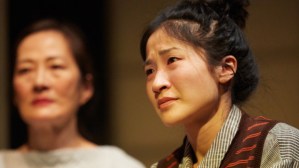Review: The Great Wave (National Theatre)
Indhu Rubasingham directs Francis Turnly’s new play
If Francis Turnly had made up the events that feature in his new play The Great Wave you would be forgiven for calling them far-fetched. The fact that they are based on the truth gives added heft to a heart-felt and engrossing story.
Turnly, who describes himself as a Japanese Ulsterman, sets up the tale like a thriller, but it is not giving away too much to say that it begins when 17 year-old Hanako goes missing from a beach at night. The authorities in the Japanese coastal town where she lives think she may have been swept away by a great wave, or perhaps murdered by her friend Tetsuo. But her mother, Etsuko and sister Reiko refuse to believe she is dead; it turns out they are right. The next time that we see Hanako she is in North Korea. The whys and wherefores are slowly revealed.
As the years pass, from 1979 to 2002, Turnly shows how the dislocation caused by the event sends its own shock waves through the lives of those affected, breaking and warping the lives of Hanako’s family. The complex realities of the North Korean regime, where the beloved leader is both father and mother, are revealed in their full Kafka-esque horror, but the people we meet are not traduced. They have their own sorrows and their country has been formed by similar political forces to those that shape Japan’s reaction to the disappearance.
The play may be relating past events but its relevance to today could not be clearer. "Where North Korea is concerned," says the slimy Japanese politician (played by David Yip, who also has a turn as a bullying detective) "we have to tread very carefully."
If the unfolding of the tale can sometimes seem a tiny bit didactic, the production has a wonderful fluidity. Complemented by Alexander Caplen’s sound design of rushing waves and echoing air, Tom Piper’s set is a rotating cube, with the paper walls of a Japanese house and the bare spaces of a North Korean home providing a blank screen for moving projections of water, of trees, of mountains.
It has a stark effectiveness that is mirrored by Indhu Rubasingham‘s direction. She brilliantly uses simple devices to create profound effects. The scene, for example, where a Korean describes his betrayal of his parents in a labour camp is staged with devastating directness, his slumped body, perfectly still as he speaks, framed by the dying light. At another moment, mother and daughter sit alongside each other, in matched poses, separated by years and miles but bound together by love.
As Hanako, Kirsty Rider has often to remain impassive, hiding her true feelings. Her skill is in always managing to reveal exactly what she is thinking. As her mother and sister Rosalind Chao and Kae Alexander are wonderfully, emotionally alert; you can feel their determination and their sadness. I also liked Leo Wan as their journalist friend, forever eager and often anxious.
Turnly’s achievement, in bringing this dark story to the stage, is to make it speak of many things. For all its pared-back dialogue, he makes it resonate loudly. The events it depicts are overwhelming, but his characters find ways to hope, to be brave and to carry on. It is a fresh and powerful piece of theatre.
The Great Wave runs in the Dorfman at the National Theatre until 14 April.
















